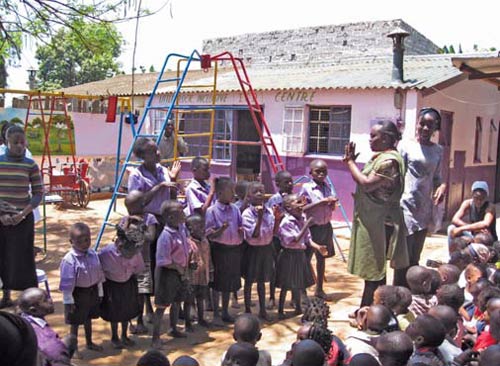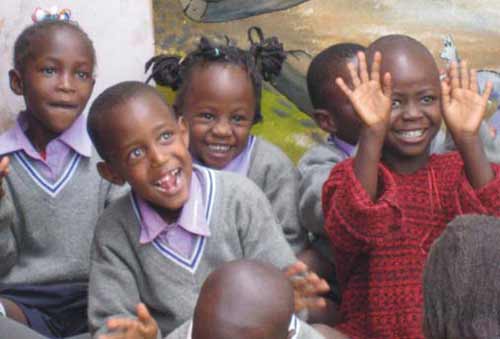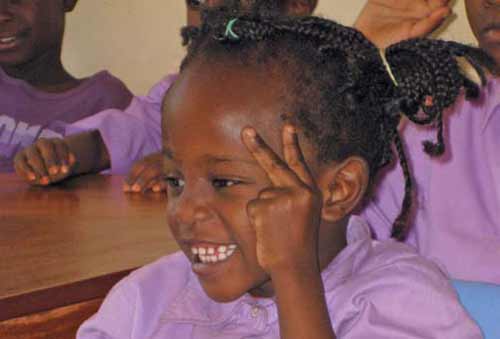A comprehensive approach to education for all in Kibera, Kenya
Lilly Oyare
It all started in 2000 when I walked around the Kibera slum in Nairobi. What I saw changed my way of thinking: children of all ages were playing in dirty ditches, and they lacked adequate food, security and education. In 2002, after much soul searching, I resigned from my teaching job and went to volunteer in one of Kibera’s schools – Calvary School and Centre. Here I saw the challenges children faced adapting to primary school, and the lack of early childhood development (ECD) opportunities. So I decided to set up the Little Rock ECD Centre and this article outlines the wide range of work the centre is now doing to support the physical, intellectual, emotional and social development of children in Kibera. Our centre has a holistic approach to inclusive education – it’s not just about disability, but about all the issues that cause children to be vulnerable and to miss out on a good education.
| Kibera is three miles from Nairobi city centre. It has a population of over one million and covers 1% of Nairobi’s land area, yet houses 25% of the city’s population. Kibera is one of the world’s largest informal urban settlements (often known as slums). Most residents lack access to basic services such as water and electricity. |
In the beginning
In 2003, free primary education was introduced in Kenya. Suddenly all the children from Kibera slum went to school, and schools could not send them away. These children had not been to pre-school, so teachers had to help them catch up – it wasn’t easy for the teachers or the children. This prompted me to start the Little Rock ECD Centre, to help children’s transition into primary schooling.
On the first day we thought we would have five children; we planned to work with them, show people our results and get more support. But 12 children turned up! Then on the second day 22 came; and on the third day we welcomed 35! We didn’t have enough space! We continued registering new children because the parents were so excited about this new service and were impressed by the progress their children were making. When we reopened after the Christmas break, 75 children were waiting at the door. We had to act quickly, and found bigger premises, but by the end of January the numbers had shot up to 100 children.

Pupils and teachers at Little Rock
Supporting deaf and physically disabled children
The hundredth child to enrol was a deaf child, Kelvin, who used to bring lunch for his younger sister and would stay until 3:30 p.m. to take his sister home. Teachers Christine and Joy had attended a Sign Language course so we decided to start a class for Kelvin and another child called Riziki. That’s how our deaf unit started in 2004. We now have 35 deaf children; 20 others have graduated to different deaf schools around Kenya. Little Rock has four teachers trained to work with deaf children, two of whom are deaf. Every teacher in the centre has learned some Sign Language, as have other children, and they really love it. Parents also come to Little Rock every Saturday to learn Sign Language so that they can communicate at home, too. In 2006 we started enrolling children with physical disabilities.
We hope to lobby the government to assist public school teachers to understand about education for children with disabilities and to develop disabilityfriendly school environments.
Ensuring inclusion by preventing hunger
In April 2004, Little Rock started a feeding programme; as we realised we couldn’t effectively teach a child who was hungry or sick. We asked corporate organisations to support the provision of morning porridge and a balanced lunch for the children. Then we approached an NGO, which visits the centre twice a month to treat sick children. They provide immune boosters to children and parents who are HIV-positive, give first aid lessons to parents, and health workshops for teachers.
After-school and sports activities
The library programme began in 2007 after I noticed that the children who had graduated from our school hung around Little Rock after school hours. They said they missed the food and play equipment and felt we were their second home. So, rather than turn them away, we bought a few school course books and story books for them to read and hired a primary teacher to assist them. The children would come to read for leisure, some would do their homework because they lacked course books at home, and slow learners were offered remedial support. The numbers increased when we invited brothers and sisters who were interested in reading to start attending.
We discovered that many children loved playing football, so a club was started and we hired a trainer. There are now 60 boys and girls in this club, 16 are deaf children. They have won several tournaments, but we struggle to afford the costs of kit and transport to attend these events. We started other clubs for drama, drumming, art and craft, computing, Sign Language, and music and dancing.
Extending our reach
We started supporting orphans in Kibera by giving food baskets using any surplus food we have at the end of the month. Some single mums, widows and widowers also started coming for food. The centre’s management therefore decided to train parents in some skills to empower them to be independent.
Fifteen parents started learning weaving, rug-, quiltand shoe-making, tailoring and beadwork – often using recycled materials. Parents are now earning something through a small shop we set up.

Kindergarten class

Learning to sign
Supporting young mums
Within Little Rock we set up a day care service for very small children – we now have 40 children aged 1 to 2.5 years old. Our first child was the child of a teenage mother. The girl’s little sister attended Little Rock and told us her older sister wanted to go back to school. We helped her to re-enrol in a local school, and we enrolled her baby in Little Rock. From there we started the day care service to release teenage mums so they could continue their education, participate in the labour force, and help break the cycle of poverty in Kibera.
Lilly Oyare is Director of Little Rock ECD Centre
Contact:
Little Rock ECD Centre
Lemule Road Olympic Estate
Kibera
P.O. Box 21319
Nairobi 00505
Kenya
Tel: +254 (0)722 272968 / 845932
Fax: 254 (0)20 387 0252
Email: littlerockecd2000@yahoo.com or
lilly@littlerockkenya.org
Web: www.littlerockkenya.org